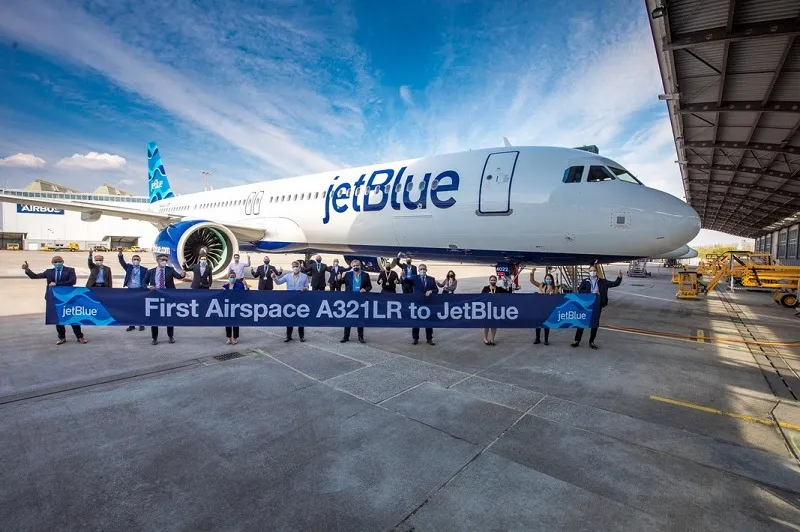
Airbus meets 2021 delivery target with 611 aircraft
Jan 10, 2022

Airbus successfully achieved its delivery target for 2021, delivering a total of 611 aircraft. This accomplishment reflects the company's resilience in navigating the challenges posed by the global pandemic and supply chain disruptions. The deliveries included a diverse range of models, catering to various market needs. Airbus's performance highlights its commitment to meeting customer demands and strengthening its position in the competitive aerospace industry. With a focus on sustainability and innovation, the company aims to continue enhancing its production capabilities in the coming years, ensuring it remains a key player in the global aviation market.
Airbus, the leading global aerospace corporation, has successfully met its 2021 delivery target by delivering a total of 611 aircraft. This achievement not only highlights Airbus's resilience in the face of ongoing challenges in the aviation industry but also solidifies its position as a key player in the market. The company’s ability to deliver such a significant number of aircraft during a tumultuous year speaks volumes about its operational efficiency and commitment to customer satisfaction.
Overview of Deliveries
In 2021, Airbus achieved a remarkable feat by delivering a diverse range of aircraft models to airlines and lessors worldwide. The following table outlines the breakdown of deliveries by aircraft type:
| Aircraft Model | Number of Deliveries |
|---|---|
| A220 | 35 |
| A320 Family | 483 |
| A330 | 23 |
| A350 | 49 |
| A380 | 21 |
This distribution of deliveries showcases "Airbus's commitment" to meeting the specific needs of its customers while also adapting to market demands. The A320 family, in particular, has seen robust demand as airlines look to enhance their fleets with more fuel-efficient and versatile aircraft.
Market Response and Customer Satisfaction
The successful delivery of 611 aircraft in 2021 has garnered positive responses from the aviation market. Airlines are increasingly looking for "reliable partners" amidst an unpredictable economic landscape, and Airbus's ability to deliver on its promises has strengthened its relationships with existing customers while attracting new ones.
Many industry analysts believe that the strong performance in 2021 reflects "Airbus's strategic focus" on innovation and sustainability. As airlines pivot toward greener operations, the demand for more fuel-efficient aircraft is at an all-time high. Airbus has responded by investing in research and development, ensuring that its aircraft remain competitive in terms of fuel efficiency and environmental impact.
Challenges Faced in 2021
Despite meeting its delivery targets, Airbus faced several challenges throughout 2021. The ongoing impact of the COVID-19 pandemic, coupled with supply chain disruptions, posed significant hurdles. The global semiconductor shortage, in particular, affected production schedules for many manufacturers, including those in the aviation sector.
However, Airbus's agile response to these challenges showcased its operational resilience. By adapting its supply chain strategies and collaborating closely with suppliers, Airbus managed to mitigate the effects of these disruptions and maintain its delivery commitments.
Future Outlook
Looking ahead, Airbus remains optimistic about future deliveries and market growth. The company has already set ambitious targets for 2022 and beyond. With a robust order backlog and a growing demand for air travel, Airbus is poised to continue its upward trajectory in the aviation industry.
Furthermore, the company is committed to enhancing its sustainability efforts. With the introduction of the "A330neo" and "A321XLR", Airbus is addressing the need for long-range, fuel-efficient aircraft that align with global sustainability goals. As airlines focus on reducing their carbon footprints, Airbus’s innovations in aircraft design are likely to play a crucial role in shaping the future of air travel.
Conclusion
Airbus's achievement of delivering 611 aircraft in 2021 is a testament to its resilience, innovation, and commitment to customer satisfaction. The successful execution of its delivery targets amidst challenging circumstances has not only strengthened its market position but also reinforced its reputation as a trustworthy partner in the aviation industry. As the company looks to the future, its focus on sustainability and operational excellence will likely drive its continued success and growth in the years to come.
In summary, Airbus's ability to navigate challenges and meet delivery targets is indicative of its robust business model and strategic vision. With an eye toward the future, Airbus is well-positioned to capitalize on emerging opportunities and further enhance its standing in the global aerospace market.
Related Articles

Explore Thailand: The Best Islands to Visit for Paradise, Adventure, and Relaxation

The Ultimate Guide to the Best Islands in Thailand for Your Next Getaway

Do babies need passports? How to get a passport for a newborn

How to get a U.S. passport fast: here’s how to expedite the process

What is Mobile Passport Control: 5 reasons why you should use it

SENTRI vs. Global Entry: A detailed guide

Do you need a passport to go to the Bahamas? Let’s find out

Do you need a passport to go to Mexico? A detailed guide

Do you need a passport to go to Canada? We got the answer

Do You Need a Passport for a Cruise: An Essential Travel Guide

Booster Seat Requirements: All the Rules to Follow in Your Rental Car

What Are the World’s Most Powerful Passports, and How Does Yours Rank?

How to Take a Passport Photo at Home: A Helpful Guide

You've got to have heart! Southwest's new livery

Your opinion: Should water be free on low cost carriers?

Young women bolder than guys as solo travellers
